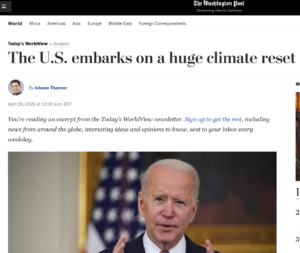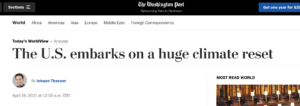https://www.washingtonpost.com/world/2021/04/19/us-embarks-huge-climate-reset/
President Biden immediately shifted course. He restored American participation in the 2015 Paris climate agreement, while recognizing that the world’s biggest economies are already lagging behind in the face of an escalating climate emergency. He issued executive orders mobilizing agencies across the federal government to focus on tackling climate change and has proposed a multitrillion dollar infrastructure and jobs plan that would accelerate the country’s transition to a greener economy.
Those talks ended as the Biden administration prepares for a major leaders summit on climate starting Thursday, where it hopes to catalyze new international action. “Ahead of that gathering, the Biden administration has said it will unveil a more aggressive plan to cut U.S. emissions — probably around 50 percent by the end of the decade, compared with 2005 levels,” my colleagues reported. “That would basically double the goal first put forth by President Barack Obama as part of the 2015 Paris climate agreement.”
Leaders elsewhere have welcomed the Biden administration’s initiative. “It’s time to deliver. It’s time to rush, and President Biden is 100 percent right to do so,” French President Emmanuel Macron said in an interview with CBS’s “Face the Nation” that aired Sunday. That urgency, he added, was justified by the pattern of extreme weather-related events of recent years.
“We are living [through] the first consequences of … the climate disaster,” Macron said, gesturing to the need for major emitters in the developing world to drastically curb their emissions, too. “We need to accelerate innovation and ability to deliver. We need India and China to be with us.”
Some 40 world leaders are expected to participate in Biden’s virtual climate summit. It’s unclear if Chinese President Xi Jinping will be one of them. Delegations will discuss a host of thorny issues, from methods to curbing emissions to the burgeoning realm of climate finance, as governments and international donors reckon with the toll climate change is already exacting on poorer and more vulnerable countries.
“It’s not meant to be a collection of our best friends,” a Biden administration official told Today’s WorldView, speaking on the condition of anonymity to discuss the event. “It’s a gathering of the world’s major economies, who also happen to be the major emitters. It’s an opportunity for level-setting and to start a conversation with the most important players at the outset of a critical decade.”
Climate is seen as perhaps the sole arena for substantive U.S.-Chinese cooperation, given the wider animosities that now define the relationship between the two powers. But even there, numerous challenges abound. “The intensifying rivalry over technology could spill into climate policy, where innovations in energy, batteries, vehicles and carbon storage offer solutions for reducing emissions,” noted the New York Times. “Already, American lawmakers are demanding that the United States block Chinese products from being used in the infrastructure projects that Biden has proposed.”
Some U.S. analysts argue that the Biden administration should leverage the support of Western allies to pressure China into reforming its energy supply through a series of carbon taxes on Chinese imports. “Negotiating proactively with China cannot curtail climate change; Beijing would impose unacceptable costs while failing to deliver on its end of any bargain,” wrote Andrew Erickson and Gabriel Collins in Foreign Affairs. “Only a united climate coalition has the potential to bring China to the table for productive negotiations, rather than the extractive ones it currently pursues.”
Chinese officials, meanwhile, do not seem to have placed great stock in the Biden administration’s climate overtures. “The expectations that climate cooperation could help reverse the downward spiral in bilateral ties are largely misplaced,” Pang Zhongying, an international affairs specialist at the Ocean University of China, told the South China Morning Post. “With both China and the U.S. hardening their stance towards each other, it’s getting harder by the day for them to still cooperate on climate in the middle of deepening, across-the-board competition.”
On his missions abroad, Kerry said the Biden administration was acting from a position of “humility,” aware of both the enormous role the United States has played for decades in emitting greenhouse gases and, more recently, in stalling more aggressive climate action under the Trump administration. On the American left, activists and some Democratic lawmakers see climate action as Washington’s moral responsibility.
“Much of the CO2 in the atmosphere is red, white and blue,” Sen. Edward J. Markey (D-Mass.) said at a webinar event earlier this month, referring to the historic legacy of American and British industrialization. “You can’t preach temperance from a bar stool.”




